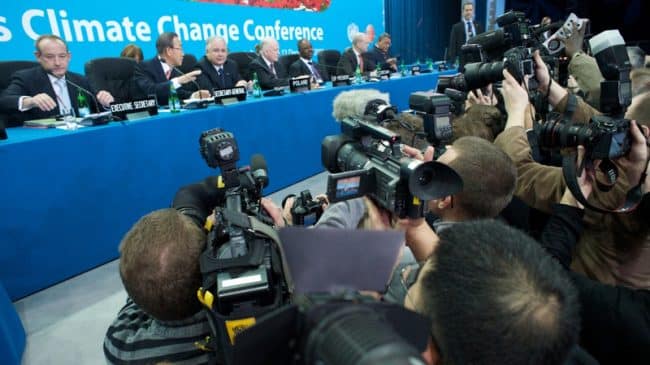According to the United Nations, the World’s population reached 7 billion people on October 31st. Well, maybe not exactly on Monday; the US Census Bureau estimates that it will happen sometime in March next year. But let’s not quibble over the date: the UN has never been very good at forecasts, especially of the future. For decades, it has claimed that the rising tide of humanity would overwhelm the environment and lead to food shortages – unless urgent action is taken to stem the tide. And for decades it has been wrong: Per capita food production has been rising and the environment generally improving.
Meanwhile, when “urgent action” has been taken, in the form of forced sterilisations, for example, or China’s one child policy, the result has been grotesque violations of human rights.
But still the UN persists. The most recent version of its apocalyptic story goes like this – Population growth and rising wealth will result in a perfect storm of increasing demand for food and increased emissions of carbon dioxide, which in turn will cause climate change that will reduce agricultural productivity, making food more scarce. To address these combined threats, it says we need to control population growth and reduce carbon dioxide emissions. The UN claims that if we follow its advice humanity will “thrive,” but it is much more likely that the opposite would be the case.
Let’s give the UN its due: it is correct that demand for food is likely to rise as the population rises and people become wealthier. More people naturally need more food and wealthier people tend to eat more meat, which requires more grasses, grains and pulses as feed than if we were ourselves herbivores.
The UN is wrong on every other count, as Professor Douglas Southgate shows in a new Reason Foundation study. First, the UN is wrong to assert that agricultural production will fall if the world continues to warm. The reason for the UN’s pessimistic prognostication is it assumes there will be only minimal technological adaptation in response to a changing climate. That belies not only logic but experience: agriculture is largely an adaptation to particular climate and soil conditions. Crops already exist that would suit many likely future climate-soil combinations. But agriculture continues to improve, with new crops and other agricultural technologies being invented all the time. So, it is likely that in the future agricultural output will rise regardless of climate change – unless there are barriers to the adoption of those new technologies.
Second, population growth rates have been declining across the world. For most of human history, large families served an essentially practical purpose: children were the main source of support for elderly parents and high infant mortality meant many children provided insurance. With the introduction of more formal and secure forms of investment, the need for children has declined. Attempts to promote more rapid reductions in population growth rates are neither necessary nor desirable.
Indeed, population growth may actually be a good thing. The late great economist Julian Simon observed, “It is your mind that matters economically, as much or more than your mouth or hands. In the long run, the most important economic effect of population size and growth is the contribution of additional people to our stock of useful knowledge. And this contribution is large enough in the long run to overcome all the costs of population growth.”
Recent evidence supports Simon’s contention, suggesting that larger, more dense populations tend to result in higher rates of innovations. So, attempts to reduce population growth rates may actually hinder our ability to adapt to change.
Cutting carbon emissions, meanwhile, is likely to make food more scarce, not less. Carbon dioxide is a natural by-product of many processes that are essential to efficient modern agriculture, from the machinery used to sew, spray and harvest fields, to the trucks used to cart food to market, to the refrigerators used to store it. Any attempt to cut carbon emissions will necessarily drive up the cost of all such processes – and thereby drive up the cost of food production, making food less affordable.
While there have been food shortages recently, these were not caused by overpopulation. They were caused by the same thing that has caused most shortages of most things: government intervention. In the US and Europe, governments have mandated the use of ethanol as part of the fuel mix. As a result, farmers diverted land to grow crops that could be converted into fuel instead of growing food crops. That reduced the amount of food available, driving up prices, resulting in riots.
Other government interventions, especially trade restrictions and regulations limiting the use of modern agricultural technologies are particularly harmful. Across the world, governments have implemented “precautionary” regulations limiting the development and marketing of crops developed using modern biotechnology – as a result of a UN agreement on “biosafety.” The US is not a signatory to this agreement and has for decades been a leader in agricultural innovation. Nonetheless, the Environmental Protection Agency has proposed new “precautionary” regulations for agricultural technologies. If the EPA pushes forward with these proposals, it is likely to slow the development of such crops globally, which would hinder the world’s ability to adapt to climate change.
If the world thrives in the next 50 years, it will be through the actions of entrepreneurs innovating and developing new technologies. Whether or not the world warms, new agricultural technologies are desirable for meeting the demands of larger numbers of increasingly wealthy people. Instead of attempting to cut carbon emissions or reducing rates of population growth, policy should focus on removing barriers to the development and dissemination of these new technologies.
Julian Morris is vice president of research at Reason Foundation.

